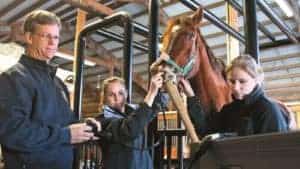
Caring for Old Horses
With proper care, senior horses can prosper. Here are a few points to consider.

With proper care, senior horses can prosper. Here are a few points to consider.

Learn how acupuncture is used to supplement conventional therapies and treatments given to equine patients.

A University of Illinois’ Veterinary Teaching Hospital researcher is seeking new approaches for treating corneal ulcers.

About 90% of performance horses and 25 to 50% of foals have ulcers. Here’s what to watch for and how to prevent them.

Researchers found that horses’ blood differs from humans and dogs when they used thromboelastometry to assess clotting.
Foals are small enough to fit in the gantry of a CT machine, which is helpful in assessing lung disease.
The thought of your new foal becoming infected with worms is a bit too much to bear for many horse owners. All it takes is one face-to-face meeting with a squirmy white roundworm, the type of parasite most common in horses under two years of ag
Spanish translation of an article on controlling access to spring pasture grasses to prevent laminitis.
Knowing how a normal foal should behave and when to call the veterinarian can go a long way toward avoiding a trip to an equine neonatal intensive care unit.
Hunting down the cause of hives is often a challenge.
Having evolved to flee in an instant, horses are equipped with a “stay apparatus” that allows them to remain upright for long periods of time. But this mechanism isn’t foolproof and sometimes it causes more harm than good.
While there are many reasons for a horse to have excessive tear production, it’s a classic sign of equine recurrent uveitis, also known as moon blindness.
One of the most common deformities that equine veterinarians deal with in newborns is contracted digital flexor tendons. This might cause foals to walk on the toes of their front hooves instead of being flat footed.
It is estimated that 3-5% of young Thoroughbreds have left laryngeal hemiplegia, also known as roaring.
It’s something you wouldn’t believe could happen unless you saw it: You walk out to the barn in the morning and start to panic when you realize your horse has cast itself. Somehow, someway, your horse has managed to lie up against a wall and is
Geriatric horses can live a happy and fulfilling life.
Stay on top of the most recent Horse Health news with
© 2022 Copyright Statement dolor sit amet, consetetur sadipscing User Terms, sed diam nonumy eirmod tempor invidunt ut labore et dolore magna aliquyam erat, sed diam voluptua. At vero eos et accusam et justo duo dolores et ea rebum. Stet clita kasd gubergren, no sea takimata sanctus est Lorem ipsum dolor sit amet.